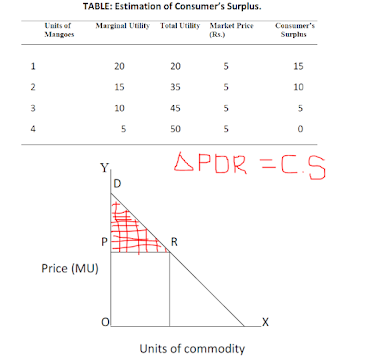CONSUMER’S SURPLUS

The concept of consumer’s surplus was first introduced by Alfred Marshall. the difference between the amount of money that a consumer actually pays for buying a certain quantity of commodity and the amount he would be willing to pay for the same quantity rather than go without it. When a consumer is prepared to buy a commodity, he always calculates the utility he is going to derive from its consumption. Every rational consumer compares the utility he derives from the consumption of a commodity, against the price he has to pay. If the utility is more than the price paid, he prefers it and if it is vice-versa, he does not buy the same good. The surplus of utility he derives is the consumer’s surplus. In a nutshell, a consumer’s surplus is the difference between what the consumer is willing to pay and what he actually pays. Assumptions of the Consumer’s Surplus The marginal utility of money for the consumer is assumed to be the same throughout the process of exchange. The commodit...



